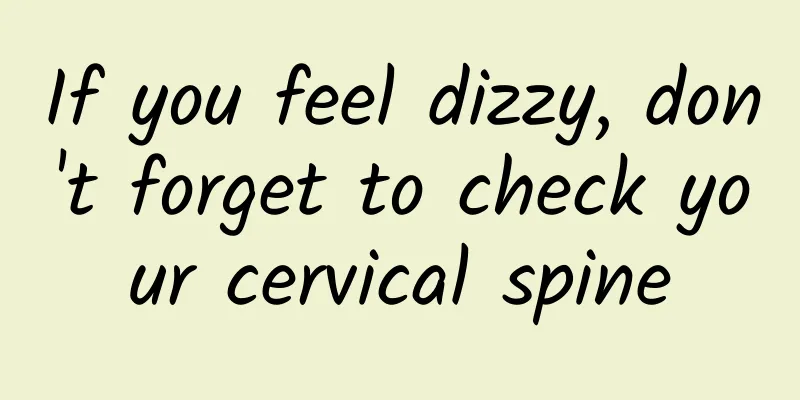If you feel dizzy, don't forget to check your cervical spine

|
Dizziness is a common symptom. Since most hospitals do not have a vertigo department, many patients first go to the neurology department for treatment. As a result, only some patients with hypertension and cerebrovascular disease are diagnosed in the neurology department, some patients are diagnosed as having otolithiasis in the otolaryngology department after being excluded by the neurology department, and some are diagnosed with ocular vertigo. However, there are still a large number of patients who often go to various departments but ultimately cannot get a diagnosis, and even cannot get a correct diagnosis after multiple episodes of dizziness. Most of these patients suffer from dizziness caused by cervical spondylosis. There is a pair of important blood vessels called vertebral arteries that supply blood to the brain. They pass through the narrow vertebral artery foramina on both sides of the cervical vertebrae. There are six pairs of these foramina. The blood vessels travel through these foramina in a rugged manner, and finally make two turns in the gap between the back of the head and the first cervical vertebra to enter the brain and supply blood to the brain. Once the cervical spine undergoes hyperplasia, degeneration, disc herniation, or changes in physiological structure, the narrow and tortuous passages through which the vertebral arteries pass will be affected, resulting in insufficient blood supply to the brain and dizziness. There are some characteristic manifestations of dizziness caused by the cervical spine. It is mainly positional vertigo, which often occurs suddenly when lying in bed, getting up, or rotating the neck, with severe dizziness, or accompanied by vomiting, or even fainting. It can be relieved by itself in an instant, but you still cannot open your eyes or turn your head, otherwise the symptoms will be induced repeatedly. The above are the manifestations of the acute phase. After the acute phase, dizziness enters the chronic phase, manifested by symptoms such as drowsiness, memory loss, and general fatigue. Some patients do not have sudden symptoms in the acute phase, and directly show symptoms of the chronic phase. Of course, most of these patients will have discomfort such as heaviness, stiffness, pain, fatigue, etc. in the neck and shoulders, and these symptoms are often easily ignored. Therefore, dizziness is not just a matter of neurology. If you still have no solution to dizziness after ruling out problems other than the brain, you need to look at your cervical spine. (Author: Li Wuqiang, Director and Deputy Director of Traditional Chinese Medicine at Sanmenxia Wuqiang Traditional Chinese Medicine Hospital) |
>>: Obesity is actually Yang deficiency
Recommend
What to do if you have stomach pain during menstruation
Women during menstruation generally have poor imm...
What are the six standards for female sex hormones?
Sex hormones are very important for women. For ex...
What are the main varieties of chrysanthemum? How many calories does chrysanthemum contain?
Chrysanthemum chrysanthemum is also rich in vitam...
What are the harms of too many miscarriages to the body?
With the opening up of social atmosphere, sexual ...
Symptoms of retained membranes after cesarean section
In fact, cesarean section is not a completely saf...
What should I do if I have sex less than three months into my pregnancy?
Under normal circumstances, you should not have s...
Normal ovulation bleeding color
Women start menstruating after the age of twelve,...
[Medical Q&A] Are there any common sites for breast cancer to occur?
Planner: Chinese Medical Association Reviewer: Ko...
I suddenly stopped having my period and I am not pregnant
Generally speaking, a normal menstrual cycle is a...
What should women eat to lighten spots?
Nowadays, especially working women in big cities,...
50 yuan to buy a hamster, 1,000 yuan to inject serum, why do hamsters bite people?
China Science and Technology News Network, Januar...
What can women eat to effectively nourish the kidney and blood?
When it comes to kidney tonification, everyone ma...
Can pregnant women use saline to wash their noses?
The salt water we often talk about is not simply ...
Leucorrhea in late pregnancy is thick and looks like snot
When a woman reaches the late stage of pregnancy,...
What is the cause of pain on the side of the breast
In recent years, the incidence of gynecological d...









